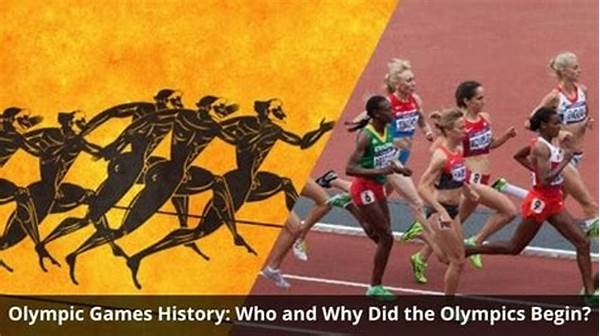History Of The Olympic Games And Their Evolution

The Olympic Games have dazzled us with feats of human endurance, majestic performances, and the spirit of competitive camaraderie. These games have evolved from ancient competitions to become the modern spectacle of sportsmanship that they are today. Imagine a time when chariots raced through dusty tracks, when athletes competed naked and were crowned with laurel wreaths, and when their feats were celebrated as offerings to gods. This was the world of the ancient Olympic Games, first held in Olympia, Greece, in 776 BC. The evolution of these games into a global event that unites thousands from almost every nation is nothing short of awe-inspiring.
Read More : Jd Sports Presents A 2025 Women’s Sporty Casual Fashion Catalog
The ancient versions of the Olympic Games were steeped in ritual and tradition, reflecting a society deeply connected to mythology and divine worship. Athletes were seen as demi-gods on Earth, their prowess speaking directly to divine favor. However, as history rolled forward, the Olympic Games took a hiatus of sorts, vanishing for centuries until their glorious revival in the late 19th century. It’s fascinating to think about the driving forces that brought the games back to life in the modern era, and how they have since transformed to reflect societal developments, technological advancements, and global politics.
Pierre de Coubertin, a French educator, is often credited with reviving the modern Olympics in 1896. His motivation was as much about fostering international peace and understanding as it was about celebrating athletic prowess. Fast forward to the current day, the Olympics have become a marketing juggernaut, providing countries with a platform to showcase their cultures, achieving a unique place in both local and international relations. As we reflect on the history of the Olympic games and their evolution, it’s clear that the event is about more than just medals. It is a complex tapestry of narratives, traditions, political aspirations, and a testament to the global community’s enduring hope for unity and peace.
Tracing the Phases of Olympic Evolution
The tale of the Olympics unfolds like an opera, changing acts over millennia but retaining a dramatic consistency in its themes. The ancient Olympics were primarily a festival of Zeus, a demonstration of physical excellence tied to spiritual devotion. These games were exclusively for male athletes who competed in a variety of sports, from wrestling and boxing to the pentathlon. The significance of these games in ancient times was astronomical, drawing massive crowds and inciting wars to pause, albeit temporarily.
In the sweeping saga of the Olympic games’ history and their evolution, a pivotal moment arrived with the fall of the Roman Empire, leading to a decline in the games’ importance and eventually their cessation in 393 AD. It took several centuries and the vision of Baron Pierre de Coubertin to revive the Olympics. The first modern Olympic Games in 1896 marked a renaissance that not only celebrated athletic skill but also reinvigorated international diplomacy and cultural exchange.
As the modern Olympics progressed, they adapted to the changing tides of history. The commercialisation of the Games introduced broadcasting deals and sponsorships, turning it into a multi-billion dollar industry. These elements attracted further interest and participation from countries worldwide, transforming the event into a truly global phenomenon. Sports once dominant in ancient times gave way to new disciplines that captured the contemporary imagination, a nod to the ongoing evolution and modernisation of human priorities and interests.
Yet, this journey has not been without its challenges. World Wars, boycotts, and political demonstrations have intermittently marred the Games. However, these events also spotlight the Olympics’ significance as a stage for broader human issues, transcending mere sport and becoming a forum for international discourse. Through these trials and triumphs, the Olympic Games stand as a testament to the enduring human spirit, resilient and ever-evolving to meet the demands of each new era.
The Olympic Games will inevitably continue to evolve, reflecting the dreams and realities of future generations. As we draw inspiration from their storied past, the Olympics invite us to dream bigger, aim higher, and unite for a future brimming with possibilities.
Key Moments in Olympic History and Their Impact
The advent of the ancient Olympics marks a seminal moment in sporting history, setting a precedent for future athletic competitions.
The games were abolished under the Roman Empire, reflecting shifts in cultural religious dynamics.
Championing international friendship and competition, the modern version resurrects the spirit of the games.
Expanding the games to include winter sports, showing adaptability and growth.
Used as a propaganda tool by Nazi Germany, highlighting the political impacts of sports.
Terrorist attacks profoundly affected security and highlighted vulnerabilities at global gatherings.
Political tensions led to notable absences, reflecting global divisions.
A landmark event remembered for its opening ceremony and sustainability efforts.
Read More : How To Build Stamina For Competitive Sports
Reflects the evolution and modernisation of the Olympic Games responding to changing interests.
Olympic Games: Their Cultural Impact and Legacy
The euphoria of the Olympics is palpable, on-screen and in locales around the globe. Whether you’re a fervent fan or a casual observer, the vibrancy of cultural displays and the ethos of sportsmanship are infectious. Engulfing entire nations in a spirit of celebration and pride, the Olympic Games are a rare moment of connection in our fragmented world. Yet, despite this veneer of unity, we must acknowledge the undercurrents of competition and nationalism that can sometimes overshadow the games’ original intent, which is bringing people together.
The Olympic Games have played a monumental role in shaping modern sports, influencing everything from funding and infrastructure to athletic training and performance standards. Cities vie for the honor of hosting the Games, even knowing the challenges they bring, driven by the promise of elevated status and the economic boost. Children dream of representing their nation, fueled by the triumphs and heartbreaks they witness every four years. This inspiration is part of the indelible legacy the Games leave behind.
But as we delve deeper into the history of the Olympic games and their evolution, it becomes clear that the Games aren’t just about who runs the fastest or jumps the highest. They echo the cultural shifts, technological advancements, and social changes that society undergoes over time. They stand as proof of humanity’s potential to transcend itself, striving for excellence and unity in a world often threatened by division.
Illustrations from the Olympic Journey
Iconic architectures that set the stage for early Olympic feats.
Symbolising unity and the spirit of the Games, this tradition connects past with present.
A microcosm of global cultures dwelling in a unified space during the games.
Artistic masterpieces that blend tradition, innovation, and cultural storytelling.
Moments of victory that encapsulate national pride and personal achievement.
Evolution of sports participating in the Olympics reflects changing tastes and inclusivity.
Transforming how audiences experience the Olympics, making it widely accessible.
Conclusion: Reflecting on the Olympic Games Heritage
Reflecting on the history of the Olympic games and their evolution reminds us of a legacy intertwined with human ambition and societal growth. Each edition of the Games is a new chapter loaded with potential for historic moments and unprecedented achievements. Their timeless charm lies not merely in their athletic prowess but in their embodiment of hope, peace, and the relentless pursuit of excellence. As we look toward the future, we can only imagine what new forms of inspiration these remarkable games will bring to the world.



